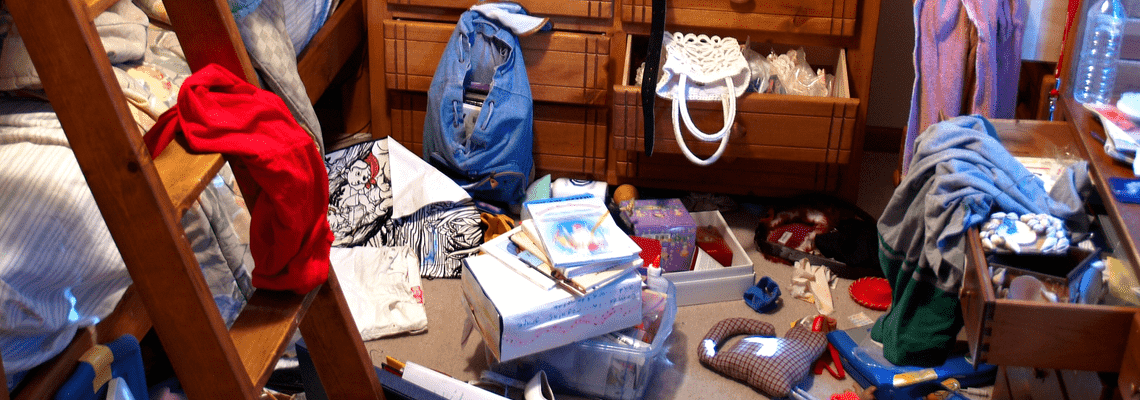We asked different writers about what it means to get rid of the physical, psychic or emotional clutter in their lives. Here are their stories.
For most of my life, I’ve dreaded clutter.
Not to say that I’m neat or organized – I am neither – but rather, I dread the moment of having to deal with it. The stuff. Even in elementary school, debris would gather in my room so fast I could barely get a grip on it.
I get chills at the very thought of sitting in a pile of debris – gum wrappers, old receipts, random craft supplies, years’ worth of junk mail – clinging hopelessly to a large black garbage bag that I will soon fill up with all the detritus of my life. Clutter is the knowledge that you generate trash. Clutter is the knowledge that you’re going to die and leave all this mess behind.
For about five years, I surfed a wave of month-to-month leases and short term sublets, which kept me from needing to buy furniture, and required that I hold the minimum amount of stuff to be able to use a friend’s car or a taxi cab in lieu of a proper moving service. In this time, I kept my personal belongings down to a minimum. It felt good, and people would react to my lack of stuff with envy or pity.
My cracked, transparent, over-sized storage bins became a personal embarrassment. At each subsequent sublet I would move but never fully unpack. A few sublets down the line, I would never even open the bins, for fear of the clutter spreading out, beyond the control of a small bedroom that was already filled with someone else’s stuff. The bins were representative of the life I wasn’t living. A refusal to settle, to commit.
I associate clutter these days with depression, with the numb, ahedonic motions keeping me in bed, sleeping, in a haze of television and meals made out of snack foods. While I disagree that cleanliness is next to godliness, I can definitely see the association between neat surroundings. One of my mother’s go-to bon mots is, “An organized house is not the sign of an organized mind.” In some sense, however, I disagree. Clutter accumulates in the spaces you ignore. It’s the physical sign of denial. Hoarders get to the point where their dead pets are hidden under piles of junk through the same exact process. Deny the junk, the mental strain it puts on you, and over time it can slowly accumulate to a massive scale.
Tidying, in its own way, is a form of self-care. It comes second nature when we are well and whole. But when we are depressed, distressed, or wrestling our demons, tidying goes the same way all the other self care goes – eating right, sleeping, bathing. The simple fifteen minute chunks spent sorting, throwing away the chaff and finding a sensible spot for the chaff – this is more than the brokenhearted can manage. Decluttering is usually a sign of spring, of hope – a new, fresh year is starting, let’s get all this garbage out of the way.
Moving in with my then-girlfriend (now-fiancee) early last year, I was struck by how much organizing we needed to do in order to merge our lives together. Small concessions felt huge. In order for her to literally (and, our couples counselor would insist, emotionally) make space for me, she would have to clear out some of her old stuff. A drawer was not so much a space for things, but for me. For me, and the disembodied me in the form of my junk. The stuff that I was contented to keep in bins, forever, and never deal with. The bins stayed in storage for weeks. We were at an impasse because neither of us wanted to deal with our clutter.
Eventually, the day came where we brought the stuff upstairs, together, and found a “home” for everything. Now, as time moves on, we are starting to find new places for things, based on not whose stuff it is, but what it is, and what location makes the most sense for the household. These are tiny strides but they lead to something more complete than just where our stuff goes – it is the making of a home, together.
Cohabiting means that I’m not free to just clutter up my life or my home with random junk whenever I want to – I mean, I can, but it will affect someone other than myself. So this junk, this stuff of life that we both generate every single day, is something we work to stay on top of, to house and, where appropriate, to rid ourselves of.
As we plan our married life together, I think a huge part of it is accepting each other’s baggage – both figurative and very literal. I’m so lucky I found someone who can handle all my random craft supplies and receipts.
Clutter is not something to dread, but something we can tackle, together.



 Follow Us On Instagram
Follow Us On Instagram
